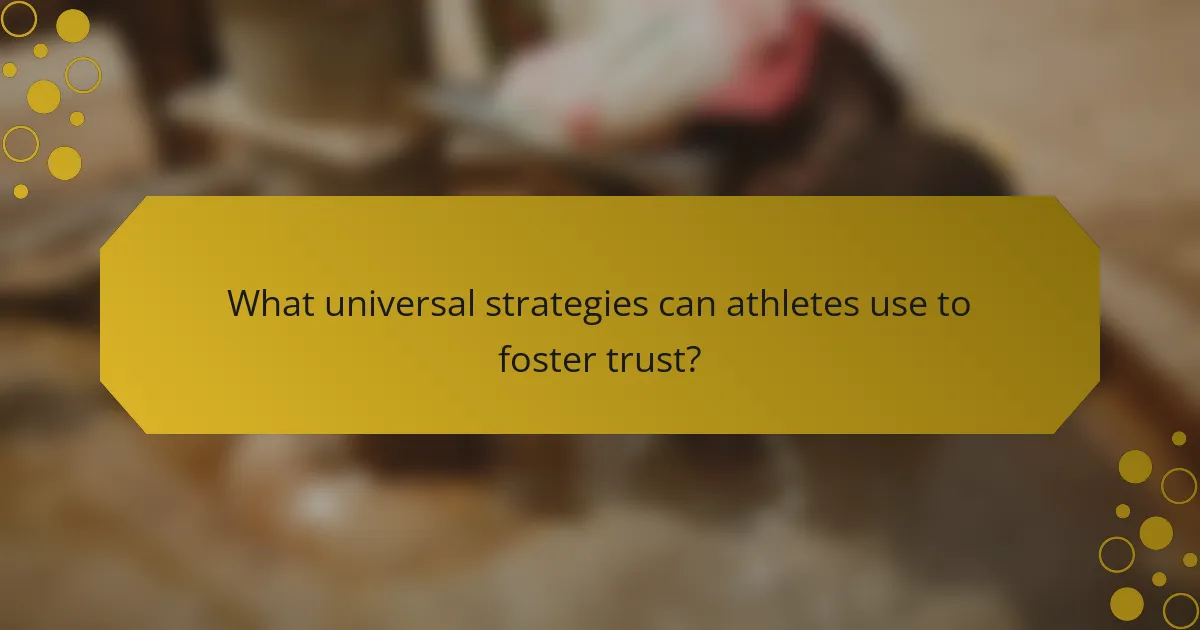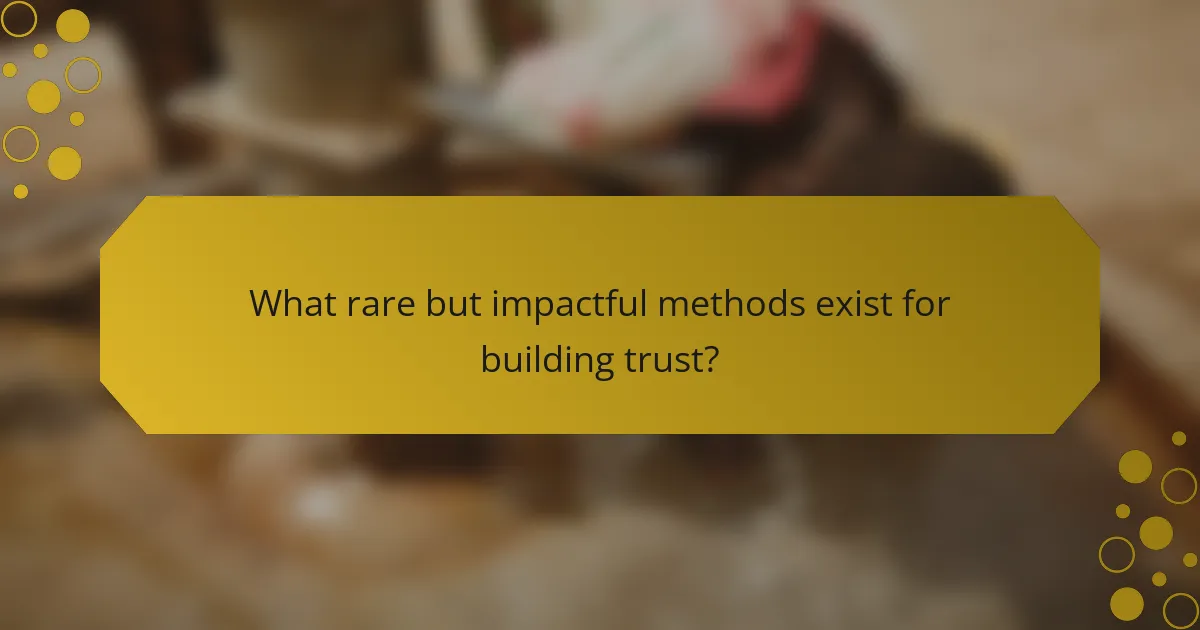Building trust in athlete post-career planning is essential for achieving lasting mental health success. This article explores the importance of open communication, the role of mentorship, and the integration of mental health professionals. It also highlights strategies for fostering emotional support and accountability through regular check-ins and team-building activities. By prioritising trust, athletes can navigate their transitions more effectively and enhance their overall well-being.

What is the importance of trust in athlete post-career planning?
Trust is crucial in athlete post-career planning as it fosters open communication, ensuring athletes feel secure in sharing their concerns and aspirations. Building trust enhances collaboration with advisors, leading to tailored strategies that support mental health. A strong trust foundation encourages athletes to embrace transitions, reducing anxiety and promoting resilience. As a result, athletes can navigate post-career challenges more effectively, contributing to lasting mental well-being.
How does trust impact mental health outcomes for athletes?
Trust significantly enhances mental health outcomes for athletes during post-career transitions. Strong relationships with coaches, teammates, and support networks foster resilience and emotional stability. Research indicates that athletes who perceive high trust levels report lower anxiety and depression rates. Trust facilitates open communication, allowing athletes to express concerns and seek help, which is crucial for mental well-being. Additionally, a trusting environment encourages adaptive coping strategies, further supporting mental health success in retirement.
What are the key factors that contribute to building trust?
Building trust in athlete post-career planning requires transparency, consistent communication, and genuine support. Establishing a safe environment encourages open dialogue about mental health challenges. Active listening plays a crucial role in understanding athletes’ needs, fostering a sense of belonging and reassurance. Additionally, providing resources and professional guidance enhances credibility, reinforcing trust in the planning process.
How can communication enhance trust in post-career planning?
Effective communication fosters trust in athlete post-career planning by promoting transparency and understanding. Open dialogue allows athletes to express concerns, share aspirations, and receive guidance tailored to their unique experiences. Trust enhances collaboration with mentors and support networks, leading to informed decisions about mental health resources. Regular check-ins and feedback loops can strengthen these relationships, ensuring athletes feel valued and supported throughout their transition. This trust ultimately contributes to lasting mental health success by creating a safe space for athletes to navigate their post-career journeys.
What role does transparency play in establishing trust?
Transparency fosters trust by promoting open communication and accountability in athlete post-career planning. This clarity allows athletes to understand available resources and support systems, which is crucial for their mental health. Research shows that transparent practices lead to higher satisfaction and engagement, enabling athletes to navigate their transitions more effectively. As a result, athletes are more likely to seek help and utilise mental health resources, thereby enhancing their overall well-being.

What universal strategies can athletes use to foster trust?
Athletes can foster trust through consistent communication, transparency, and shared experiences. Building relationships with teammates and mentors enhances emotional support and creates a safe environment. Regular check-ins and open discussions about mental health promote accountability and understanding. Engaging in team-building activities strengthens bonds, encouraging collaboration and trust.
Which best practices lead to effective post-career planning?
Building trust in athlete post-career planning involves clear communication, support systems, and personalised strategies. Establishing open dialogue fosters transparency and encourages athletes to express concerns. Providing access to mental health resources ensures athletes feel supported during transitions. Tailoring plans to individual needs enhances engagement and commitment to the process. Regular follow-ups reinforce trust and demonstrate ongoing support.
How can support networks enhance trust in planning?
Support networks significantly enhance trust in planning by fostering open communication and shared experiences. They provide emotional support, which helps athletes feel valued and understood during post-career transitions. Research indicates that athletes with strong support systems report higher levels of confidence in their planning processes. This trust is rooted in the unique attribute of shared goals and mutual accountability within these networks. As a result, athletes are more likely to engage in proactive planning, leading to improved mental health outcomes.

What unique approaches can enhance trust in athlete post-career planning?
Building trust in athlete post-career planning requires unique approaches that prioritise transparency and personalised support. Engaging former athletes as mentors fosters relatable guidance. Incorporating mental health professionals into planning emphasises emotional well-being. Regular check-ins create accountability and ongoing support. Utilising technology for personalised resources enhances accessibility and engagement.
How can personalised planning improve trust levels?
Personalised planning enhances trust levels by aligning support with individual athlete needs. Tailored strategies foster open communication, demonstrating commitment to their well-being. This approach builds confidence and reduces anxiety, critical for mental health success post-career. Personalised planning also encourages athletes to express concerns, leading to stronger relationships with advisors.
What role do mentorship programmes play in building trust?
Mentorship programmes play a crucial role in building trust during athlete post-career planning. They provide personalised guidance, fostering open communication and emotional support. As a result, athletes develop confidence in their transition, knowing they have a reliable mentor to navigate challenges. This relationship enhances their mental health by reducing anxiety and promoting resilience. Trust built through mentorship ultimately leads to lasting success in post-career endeavours.

What rare but impactful methods exist for building trust?
Building trust in athlete post-career planning requires transparency, active listening, and personalised support. One rare but impactful method is creating peer mentorship programmes where former athletes guide their peers through transitions. This fosters authentic connections and shared experiences, enhancing trust. Additionally, utilising mental health professionals who specialise in athlete transitions can provide tailored support, addressing unique challenges. Regular workshops focusing on mental health awareness can further reinforce trust, creating a safe space for open discussions.
How can innovative technology be used to foster trust?
Innovative technology can enhance trust in athlete post-career planning by providing transparent data and personalised support. Digital platforms enable athletes to access tailored mental health resources, fostering a sense of security. Blockchain technology can ensure the integrity of information shared, promoting accountability. Furthermore, virtual reality tools can simulate career transition scenarios, helping athletes visualise outcomes and build confidence in their decisions.
What are the benefits of peer-led initiatives in trust-building?
Peer-led initiatives significantly enhance trust-building by fostering genuine connections among athletes. These initiatives create a safe space for sharing experiences, which promotes vulnerability and openness. Participants often feel more comfortable discussing mental health challenges when engaging with peers who understand their unique circumstances.
Additionally, peer-led programmes can reduce stigma associated with mental health issues. When athletes witness others openly addressing their struggles, they are more likely to seek help themselves. This shared understanding cultivates an environment of support and accountability.
Moreover, peer-led initiatives encourage active participation and engagement in mental health planning. Athletes gain confidence in their ability to navigate post-career transitions, leading to improved overall mental health outcomes. This empowerment is a unique attribute of peer-led approaches, making them effective in building lasting trust.

How can athletes ensure lasting mental health success after their careers?
Athletes can ensure lasting mental health success after their careers by proactively engaging in post-career planning. Building trust with mental health professionals fosters open communication, essential for support. Establishing a strong support network, including family and friends, enhances emotional resilience. Regularly practising mindfulness and self-care techniques promotes ongoing mental well-being. Additionally, seeking mentorship opportunities allows athletes to share experiences and guide others, creating a sense of purpose. Finally, participating in community activities can strengthen social connections and provide fulfilment beyond sports.
What are the common pitfalls in post-career mental health planning?
Common pitfalls in post-career mental health planning include lack of preparation, insufficient support networks, and failure to recognise identity shifts. Many athletes struggle with transitioning from their sports identity, leading to feelings of loss and isolation. Inadequate mental health resources can exacerbate these issues, making it essential for athletes to seek comprehensive planning that includes emotional and psychological support. Engaging with mental health professionals and peers can mitigate these risks, fostering resilience and adaptability.
How can athletes maintain a positive mindset post-retirement?
Athletes can maintain a positive mindset post-retirement by engaging in structured planning and seeking support. Establishing a routine, pursuing new interests, and connecting with peers fosters mental resilience. Research indicates that athletes who actively participate in community and mentorship programmes report improved mental health outcomes. Regular physical activity and mindfulness practices also enhance emotional well-being. Emphasising these strategies helps athletes transition successfully into life after sports.
What role does self-care play in mental health maintenance?
Self-care is essential for maintaining mental health, especially in athlete post-career planning. It fosters resilience, reduces stress, and enhances emotional well-being. Engaging in self-care practices, such as mindfulness and physical activity, can significantly improve mental health outcomes. Studies indicate that athletes who prioritise self-care report lower levels of anxiety and depression during transitions. Establishing a routine that includes self-care can help athletes navigate the challenges of post-career life successfully.
What expert insights can guide athletes in their post-career journey?
Expert insights for athletes in their post-career journey emphasise the importance of trust in planning for mental health. Establishing a support network is crucial; athletes should seek mentors and mental health professionals who understand their unique experiences. Engaging in continuous education about mental health can empower athletes to navigate challenges effectively. Building a routine that incorporates physical activity, mindfulness, and social interaction can enhance overall well-being. Lastly, sharing experiences with peers can foster a sense of community and reduce feelings of isolation.
What are the top strategies for avoiding burnout after sports?
To avoid burnout after sports, athletes should focus on building a support system, engaging in new activities, and prioritising mental health. These strategies foster resilience and promote a healthy transition into post-career life.
Establishing a support network, including friends, family, and mental health professionals, provides emotional stability. Engaging in diverse hobbies encourages personal growth and reduces the risk of identity loss. Prioritising mental health through practices like mindfulness and regular therapy sessions ensures ongoing well-being.
Athletes should also set realistic goals, allowing for gradual adjustment to life after sports. Regular physical activity, even if not competitive, helps maintain physical and mental health. Creating a routine that balances leisure and productivity can mitigate feelings of aimlessness.
Lastly, reflecting on past achievements and embracing new challenges can strengthen self-esteem and foster a sense of purpose, essential for long-term mental health success.
How can athletes leverage their experiences for personal growth?
Athletes can leverage their experiences for personal growth by reflecting on challenges and successes. This reflection fosters resilience, enhances self-awareness, and builds leadership skills. Engaging in mentorship or coaching roles allows athletes to share insights, reinforcing their own growth while impacting others positively. Additionally, pursuing education or new career paths enables them to apply their discipline and work ethic outside sports, promoting lasting mental health success.
